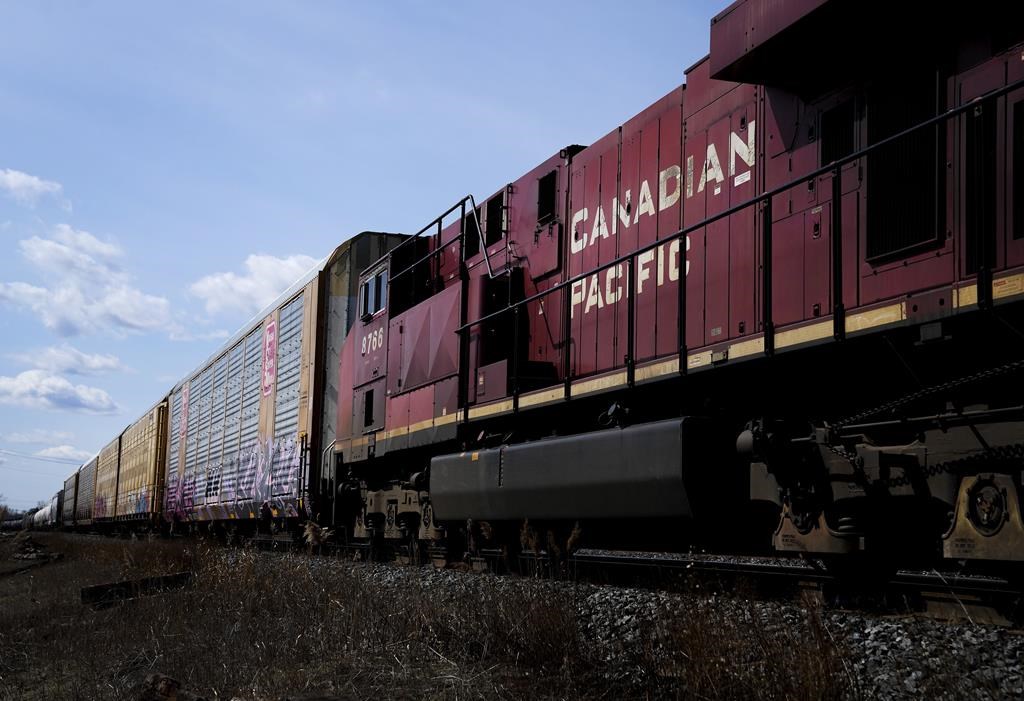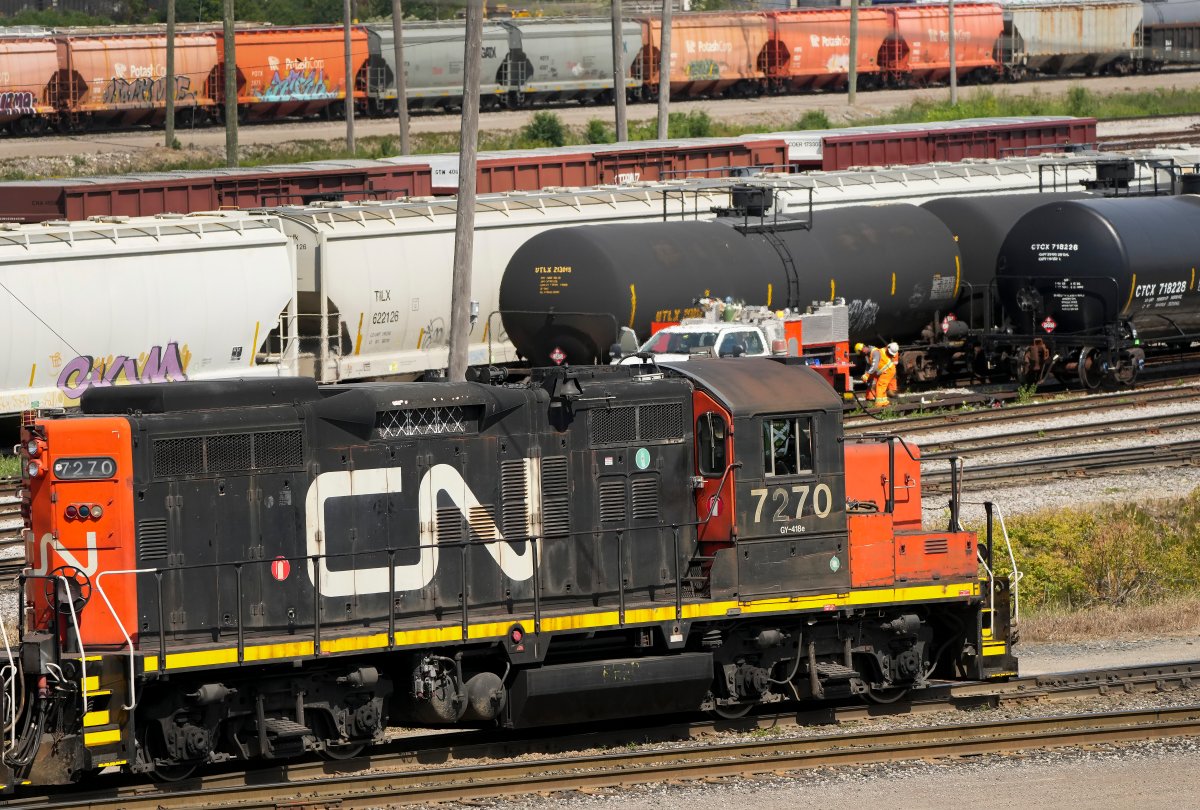A new rail shipping rule is poised to drive up inefficiency and consumer costs.

Or it will drive them straight down. It depends who you ask.
Set to come into effect with Ottawa’s federal budget bill, an obscure law has Canada’s two main railways fighting back over concerns about expenses and congestion, with the drama playing out in social media posts and a backroom lobbying push.
At the centre of the tempest in a train yard is legislation that aims to expand what’s known as extended interswitching, a seldom-heard term that describes a critical practice in the rail industry.
Interswitching refers to the transfer of cargo between two rail companies at a point where their tracks meet. Extended interswitching is when Company A must transport that cargo along its own tracks to a point where it meets Company B’s rails, and it’s currently required on request for distances of up to 30 kilometres.
The practice seeks to spur competition, as someone shipping from a grain elevator on Canadian National Railway Co. tracks, for example, could choose to have the freight transported by Canadian Pacific Kansas City Ltd. instead if the price is better.
The budget bill, which passed in the House of Commons on Thursday and now awaits Senate approval, proposes a pilot that would extend the interswitching zone to 160 kilometres from 30 kilometres in the three Prairie provinces for an 18-month period.
The move aims to tamp down prices, but it has awoken Canada’s two railway giants, prompting them to go on the offensive to warn of the deep harm they say it will inflict.
“The cargo handoffs will snarl traffic; they will soak up time and personnel,” states a CN Rail ad that aired on a Canadian political affairs podcast. “They will result in delays. They will drive up the railways’ costs. And who do you think will pay for it? The same person who always pays: the consumer.”
Shipping times will grow by up to 25 per cent, the ad warns, comparing the cargo hand-offs to “forcing airlines to deliver passengers to their competitors back and forth on several flights instead of a direct non-stop.”
Echoing CN’s concerns, CPKC said the “drastic” and “extraordinary remedy” seeks to solve a nonexistent problem in a move that will further boost inflation.
Railways have not held back on attempts to influence politicians, either.
Lobbyists with Canadian Pacific had 96 meetings with public office holders in the first four months of 2023, the same number it posted through all of 2022, according to the federal lobbyist registry. More than 30 involved civil servants – mainly Transport Canada’s – or ministerial offices. Another 10 were sit-downs with House of Commons or Senate transport committee members. The Railway Association of Canada filed 17 lobbying reports since the start of the year, versus seven for the entirety of 2022.

On the other side of the issue are farmers, who disagree on virtually every point. Industry groups say the change will lead to lower costs, higher efficiency, better access to markets and increased competition.
The debate is a heated one. John Corey, president of the Freight Management Association of Canada, said the railways have “gone above and beyond apoplectic” in their objections, calling their claims of congestion, job cuts and American encroachment “B.S.”
“They can control their networks and control their customers … without having to adjust to competitive forces or adjust to what their customers may want,” said Greg Cherewyk, who heads Pulse Canada, which represents 25,000 farmers of peas, lentils and beans. “There’s a reluctance to lose that power.”
Over the past month, groups ranging from the Alberta Wheat Commission to the Canadian Canola Growers Association have promoted the effort on social media. Kevin Waugh, chair of the Conservatives’ Saskatchewan caucus, has touted the Liberal measure on Twitter as offering ”
“greater flexibility in transportation choices” and “more efficient and cost-effective supply chains.”
Meanwhile, stances opposing the law have formed the throughline of the Railway Association of Canada’s public statements since the budget was tabled on March 28.
In an emailed statement, association CEO Marc Brazeau said U.S. railroad operators will be able “to reach hundreds of kilometers into Canada” to snap up shipments handed over involuntarily by domestic railways.
The Teamsters Canada Rail Conference, representing 16,000 workers, also warned of possible job cuts if U.S. operators pick up more business.
Moreover, Ottawa slid the change into the 2023 budget “without consulting railways,” Brazeau claimed.
The government based its decision on a recommendation from a supply chain task force report last fall, said Nadine Ramadan, a spokeswoman for Transport Minister Omar Alghabra.
- Premier Moe responds to Trudeau’s ‘good luck with that’ comment
- Drumheller hoping to break record for ‘largest gathering of people dressed as dinosaurs’
- Planning a summer trip to Quebec’s Îles-de-la-Madeleine? You’ll have to pay up
- As Canada’s tax deadline nears, what happens if you don’t file your return?
“The railways were actively consulted throughout the task force process, and both Transport Canada and our office continue to communicate with the railways regularly,” she said in an email.
The pilot is specific to the Prairies to avoid clogging key arteries such as the B.C. Lower Mainland or the Quebec-Windsor corridor, she said.
“There are very minimal operational changes,” said Wade Sobkowich, who heads the Western Grain Elevator Association, which handles 90 per cent of the grain grown in a given year _ mostly for export. When a similar extended interchange rule came into effect for three years starting in 2014, less than one per cent of the grain was interchanged within 160 kilometres of the shipping point, he said.
Railways that hope to steer clear of extended interswitching could simply lower their prices to retain their customers, he argued.
“What it does is it gives the shippers some bargaining power,” he said.





Comments